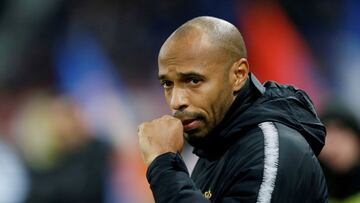Henry: Kneeling debate has diverted attention from racism issue
"There was the debate recently about taking the knee or standing, but that's not the debate," former said France international Henry, who suffered racial abuse during his playing career.

Former Arsenal striker Thierry Henry said the debate over whether soccer players should take a knee before games has diverted attention from the real issue of addressing racial discrimination.
Players in England's top flight have been taking a knee since July, initially in support of the 'Black Lives Matter' movement before the Premier League and English Football League linked the gesture to their own anti-racism campaigns.
Zaha protests against kneeling
Crystal Palace's Wilfried Zaha became the first Premier League player this month not to take a knee after he said the meaning of the gesture, which he called "degrading", has been lost.
"There was the debate recently about taking the knee or standing, but that's not the debate," former France international Henry, who suffered racial abuse during his playing career, told CNN Sport. "That's not the cause.
"The cause is: what are you going to do for it to be better for everybody? Equality. Everybody, and obviously I'm going to talk about my community.
"I thought kneeling was a strong message and we all know where it comes from, but then the discussion moved to: are we standing or are we kneeling?
"What about the cause? What about the main point of why we are doing it in the first place? Or why we still have to do it? That's something for me that is very important and we keep on forgetting about it."
Henry deletes social media
Henry, 43, last week deleted his social media accounts to protest against the platforms for not taking action against anonymous account holders who are guilty of racism and bullying online.
Related stories
English soccer's governing bodies said last month that Twitter, Facebook and Instagram were "havens for abuse" and urged the social media companies to tackle the problem in the wake of racist messages aimed at players.
Instagram has announced a series of measures to tackle online abuse, while Twitter, who took action on more than 700 cases of "abuse and hateful conduct" related to soccer in Britain in 2019, promised to continue its efforts to curb the problem.
